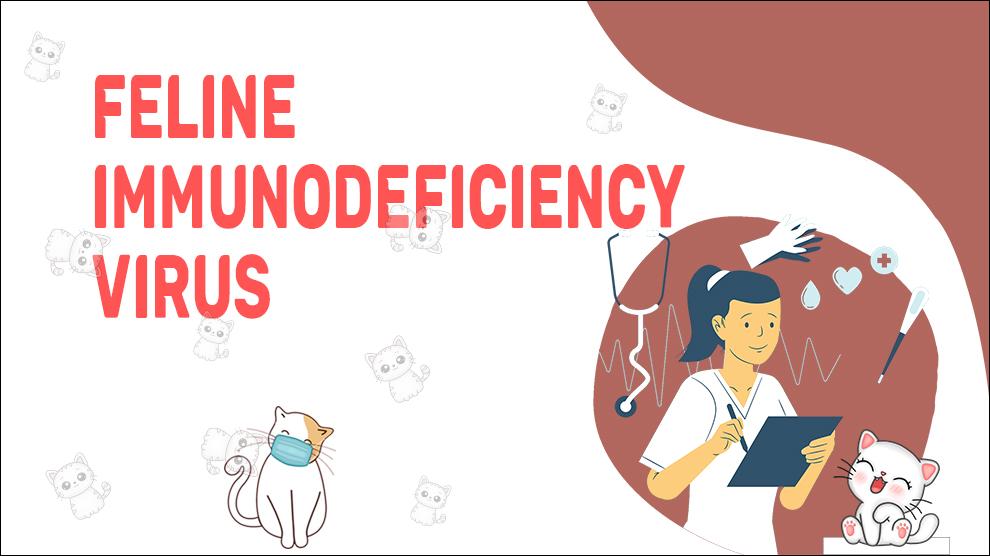What Is Feline Immunodeficiency Virus?
Feline Immunodeficiency Virus (FIV) is a viral disease that affects cats worldwide.
It is a slow-acting virus that attacks the immune system, leaving the cat vulnerable to a wide range of infections and diseases.
FIV is similar to the human immunodeficiency virus (HIV) that causes AIDS in humans. However, FIV cannot be transmitted to humans and vice versa.
FIV is most commonly transmitted through bites from infected cats, making it more prevalent in outdoor and stray cats.
Clinical Signs Of Feline Immunodeficiency Virus
The symptoms of Feline Immunodeficiency Virus can vary from cat to cat and may range from mild to severe.
Some cats may not show any symptoms for years after being infected, while others may experience recurrent infections and illnesses.
Some common symptoms of FIV may include:
- Fever
- Lethargy
- Loss of appetite
- Weight loss
- Recurrent infections
- Enlarged lymph nodes
- Dental problems
- Skin and coat problems
- Behavioral changes
- Dull Coat
- Gum Inflammation
- Mouth Inflammation
- Eye Inflammation
- Diarrhea
- Seizures
- Swelling Of The Lymph Nodes
- Nasal Discharge
- Sneezing
As FIV progresses, cats may become more susceptible to infections and illnesses, and their quality of life may decline.
Treatment Options For Feline Immunodeficiency Virus
There is no cure for Feline Immunodeficiency Virus, but treatments can help manage symptoms and improve the cat's quality of life.
Treatment may include medications to control infections, immune system boosters, and supportive care.
It is important to work closely with a veterinarian to develop a treatment plan that is tailored to the individual cat's needs.
Home Remedies For Feline Immunodeficiency Virus
There are no home remedies for Feline Immunodeficiency Virus, but providing a calm and stress-free environment can help support the cat's immune system and overall health.
Additionally, feeding a high-quality, balanced diet can also help support the cat's immune system and improve its overall health.
How To Prevent Feline Immunodeficiency Virus?
Prevention is key when it comes to Feline Immunodeficiency Virus.
Some measures that can help prevent the spread of FIV include:
- Keeping cats indoors to prevent exposure to infected cats
- Testing for FIV before adopting or bringing a new cat into a household
- Spaying or neutering cats to prevent roaming and fighting
- Keeping cats up-to-date on vaccinations to help prevent other illnesses
Affected Cat Breeds Of Feline Immunodeficiency Virus
Feline Immunodeficiency Virus can affect any breed of cat, but it is more prevalent in outdoor and stray cats.
Causes For Feline Immunodeficiency Virus
Causes:
Feline Immunodeficiency Virus is caused by a retrovirus that attacks the immune system of cats.
The virus is most commonly transmitted through bites from infected cats, particularly in outdoor and stray cats.
FIV can also be transmitted from an infected mother cat to her kittens during pregnancy, birth, or through nursing.
When To See A Vet For Feline Immunodeficiency Virus?
If a cat exhibits any symptoms of the Feline Immunodeficiency Virus, it is important to see a veterinarian right away.
Early diagnosis and treatment can help manage symptoms and improve the cat's quality of life.
Additionally, if a cat has been exposed to an FIV-positive cat, it is important to have them tested for FIV.
Food Suggestions For Feline Immunodeficiency Virus
Feeding a high-quality, balanced diet is important for cats with Feline Immunodeficiency Virus.
A diet that is rich in protein and low in carbohydrates can help support the cat's immune system and overall health.
It is also important to feed a diet that is free from artificial preservatives, colors, and flavors. Additionally, providing fresh, clean water at all times is essential for cats with FIV.
Conclusion
Feline Immunodeficiency Virus is a serious viral disease that can have a significant impact on a cat's health and quality of life.
While there is no cure for FIV, treatments can help manage symptoms and improve the cat's overall health.
Prevention measures, such as keeping cats indoors, testing for FIV before adopting or bringing a new cat into a household, and spaying or neutering cats to prevent roaming and fighting, can help reduce the spread of FIV.
If a cat exhibits any symptoms of FIV, it is important to see a veterinarian right away for early diagnosis and treatment.
By working closely with a veterinarian and providing a calm, stress-free environment and a high-quality, balanced diet, cats with FIV can live happy, healthy lives.











